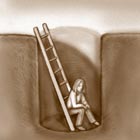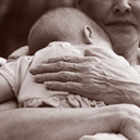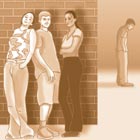Who’s at Risk for Depression?

All over the world, depression is much more common in women than in men. In the United States, the ratio is two to one, and depression is the main cause of disability in women. One out of eight women will have an episode of major depression at some time in her life. Women also have higher rates of seasonal affective disorder, depressive symptoms in
bipolar disorder, and
dysthymia.
Why are women so disproportionately affected? Many theories have been advanced to explain this difference. Some experts believe that depression is underreported in men (see
Men and Depression). But there may also be other, more complex reasons for women’s greater vulnerability to depression. <v:shapetype id=_x0000_t75 coordsize="21600,21600" o:spt="75" o:preferrelative="t" path="m@4@5l@4@11@9@11@9@5xe" filled="f" stroked="f"><v:stroke join=""></v:stroke><v:formulas><v:f eqn="if lineDrawn pixelLineWidth 0"></v:f><v:f eqn="sum @0 1 0"></v:f><v:f eqn="sum 0 0 @1"></v:f><v:f eqn="prod @2 1 2"></v:f><v:f eqn="prod @3 21600 pixelWidth"></v:f><v:f eqn="prod @3 21600 pixelHeight"></v:f><v:f eqn="sum @0 0 1"></v:f><v:f eqn="prod @6 1 2"></v:f><v:f eqn="prod @7 21600 pixelWidth"></v:f><v:f eqn="sum @8 21600 0"></v:f><v:f eqn="prod @7 21600 pixelHeight"></v:f><v:f eqn="sum @10 21600 0"></v:f></v:formulas><v:path o:extrusionok="f" gradientshapeok="t" o:connecttype="rect"></v:path></v:shapetype><v:shape id=_x0000_i1025><v:imagedata src="file:///C:\DOCUME~1\ehenry\LOCALS~1\Temp\msohtml1\01\clip_image001.jpg" o:title=""></v:imagedata></v:shape>
Women Under Stress

A survey of 30,000 people in 30 countries has found that in similar circumstances, women are more likely than men to say they are under stress. Other studies suggest that women are three times more likely than men to become depressed in response to a stressful event. And women are disproportionately subject to certain kinds of severe stress �?especially child sexual abuse, adult sexual assaults, and domestic violence.
Everyday experiences as well as traumatic ones may provoke stress, leading to depression in women. Women, who are often raised to care for others, tend to subordinate their own needs more than men. For example, women who work outside the home also tend to work a "second shift" �?taking care of housework, children, and older relatives. Many have too much to do in too little time, with too little control over how it is done. Marriage and children, while a haven for some women, ratchet up the stress level for others. Studies have found that, compared with their single counterparts or married men, married women are less likely to feel satisfied. In an unhappy marriage, the wife is three times more likely to be depressed than the husband. Being a mother of young children increases your risk for depression, too.
Another kind of stress is poverty. Women are on average poorer than men �?especially single mothers with young children, who have a particularly high rate of depression.
The Effect of Hormones

Premenstrual syndrome (PMS) can involve emotional fluctuations on top of physical symptoms such as bloating and tiredness. Women with PMS may feel sad, anxious, irritable, and angry. They may also suffer from crying spells, mood changes, trouble concentrating, loss of interest in daily activities, and a feeling of being overwhelmed or out of control. Sometimes depression is mistaken for PMS, or vice versa. To help distinguish the two, chart your symptoms through two menstrual cycles to see if they appear only in the week before menstruation and go away a day or two after bleeding begins. If a clear and persistent pattern emerges, it’s likely that changing hormone levels are to blame. If a clear pattern doesn’t emerge, depression may be the culprit.
Premenstrual dysphoric disorder is a severe form of PMS that occurs in 2%�?0% of menstruating women. It can cause symptoms similar to a major depressive episode in women who are unusually sensitive to the changing hormone levels of the menstrual cycle. Some of that sensitivity may be due to interactions between female hormones and neurotransmitters that regulate mood and arousal.
Whether PMS, premenstrual dysphoric disorder, or depression is at the root of your symptoms, it’s important to talk to your doctor about the fluctuations in your mood and how best to treat them.
Researchers are also investigating whether hormones play a role in depression around the time of menopause. Some women report feeling depressed during perimenopause, a time of transition that occurs in the months or years before menstruation stops. It’s commonly believed that declining levels of estrogen are to blame, although this has not been proved scientifically. When estrogen is given to treat depression, the results have been mixed. For now, estrogen’s role in depression during perimenopause remains controversial.
Genes
There is evidence to suggest that genes play a role, too. Researchers have identified certain genetic mutations that are linked to severe depression �?some of which are found only in women. In one of these cases, the mutation is in a gene that controls female hormone regulation. These biological differences could account for some of the difference in the rates of depression between men and women.
Expectant and New Mothers

During pregnancy, women should be cautious about taking any type of medication. But the risks of not taking a needed medication should be weighed against the possible risks (to both mother and baby) of taking the drug. Drugs to treat depression are no exception. Mothers-to-be who are depressed may have a hard time caring for themselves. They are more likely to miss doctors�?appointments and to drink alcohol or use drugs. Their children may end up having lower birth weights and associated health problems. And of course, depression can sometimes be fatal through suicide. When depression is severe, pregnant women may find that the benefits of treatment far outweigh the risks.
The understanding of how antidepressant medications affect the babies of mothers who take these drugs during pregnancy is still evolving. In 2005 and 2006, studies showed a higher risk of relatively rare birth defects in babies whose mothers took SSRI medications during pregnancy. And some newborns develop withdrawal symptoms like abnormal crying and irritability as the medication leaves their system. Mood stabilizers, including lithium (Eskalith, Lithonate) and carbamazepine (Tegretol), also have been linked to a higher risk of birth defects. In general, the risks to the babies are small. In every case, a woman should discuss with her doctor the advantages and disadvantages of taking (or stopping) any depression or mood-stabilizing drugs during pregnancy.
Studies have found that antidepressants don’t pose a serious risk to nursing infants. As a safeguard, though, nursing women might opt for drugs that don’t accumulate in breast milk, such as sertraline (Zoloft).
Some pregnant or breast-feeding women prefer to err on the safe side and avoid medication. In addition to psychotherapy (and ECT in severe cases), these women can try phototherapy, which uses bright artificial light to help lift depression (see Seasonal Affective Disorder). This has been shown to help some people out of depression, including pregnant women.
Postpartum Depression
More than half of women who’ve recently had a baby endure the weepy, anxious, emotional time known as the "baby blues." Yet, unlike the baby blues, which usually last no more than a few weeks, postpartum depression continues and deepens. About 10%�?5% of new mothers experience depression within three to six months after childbirth. Coming at a time that culture dictates should be happy and fulfilling, this type of depression can carry a stigma that makes some women reluctant to admit to it.
Sleep deprivation, the dramatic changes and stresses that accompany motherhood, and shifts in hormones all seem to have a hand in postpartum depression. Physical discomfort, a colicky or sick baby, financial hardship, and scant social support may also be factors. Postpartum depression has many features in common with
major depression. A new mother can become sad or hopeless. She may be anxious and especially worried about the baby’s well-being. She may not be able to function and may be overwhelmed by caring for her baby. She may experience changes in appetite that lead to weight loss or gain. She may also lose interest in everything, including the baby, and feel guilty or worthless as a result. If you suffer postpartum depression, treatments (including medications and psychotherapy) can make a big difference for both you and your baby (see
Treatment for Depression: Getting Help).
Men and Depression
Although there is considerable evidence that women are twice as likely as men to become depressed, some researchers question this statistic. They contend that if studies accounted for differences in how men and women express and cope with their emotions, this apparent gap in depression rates would diminish or possibly disappear.
Typically, men are more likely to shy away from talking about their feelings, and doctors may bring up emotional topics less often with men. In addition, many men don’t feel comfortable acknowledging the need for help, making them less likely to seek assistance than women are. Men also tend to describe the experience of depression in less intense ways than women do.
Depression in men may be obscured behind a variety of physical complaints, such as low energy, aches and pains, a loss of appetite, or trouble sleeping. Or the problem may come out as substance abuse, anger, or belligerent behavior. Even if other symptoms of depression are present, some men may not feel sad. And if a loved one raises the subject, they may not be willing to admit the possibility that they are depressed. Yet when such men receive treatment for depression, their symptoms often disappear, and in retrospect they may concede that they were, in fact, depressed.
Men Have Hormones, Too
Some researchers have examined whether fluctuations in testosterone levels may promote depression. Later-life changes in sex hormones are not as clear-cut in men as they are in women, but testosterone levels do decrease gradually as men age (a change that is sometimes dubbed "male menopause"). A quarter to a half of men over 50 have testosterone levels that can be considered abnormally low. The problem is more likely to arise if they drink excessively or if they are overweight or under stress (either physical or psychological).
Physicians still have a lot to learn about this subject, but it’s possible to offer a few guidelines. Any man in middle age or older who notices mild to moderate depressive symptoms for the first time may have a problem with low testosterone. A physician can check his testosterone levels, along with pituitary hormone levels and liver and thyroid function. If testosterone is low, it may be worthwhile for him to take a supplement, along with psychotherapy, an antidepressant drug, or both. The more severe the depression, the less likely it is to be related to testosterone deficiency, since low testosterone levels are not closely associated with major depression.
Bringing testosterone levels back into the normal range is relatively safe, but long-term treatment is not without its problems. Testosterone supplements can increase the risk of prostate cancer, spur benign prostate enlargement, and (by boosting the concentration of LDL or "bad" cholesterol) promote heart disease. Liver damage can also occur. Some men develop gynecomastia (breast swelling), headaches, rashes at the site of application, acne, baldness, or emotional instability. Long-term treatment may suppress natural testosterone production, creating problems if the supplement is abruptly withdrawn.
It’s reasonable for older men to consider testosterone as a treatment for depressive symptoms, but only after a full endocrine or hormone evaluation has been done. Because of the many potential side effects, you should begin testosterone therapy only after careful consideration and an in-depth discussion with your doctor.
Work and relationships
In this culture, male self-esteem often depends on success at work, physical skill or power, and being physically or mentally active. If a man’s capacity in any of those areas is diminished �?especially if he loses a job or his marriage fails �?it may help trigger depression.
Depression is so common that it should be considered as much a problem for men as it is for women. In fact, men are more at risk for the worst outcome of depression �?suicide. Family members, friends, and caregivers may need to meet them more than halfway to see that they get the help they need (see How to Cope When a Loved One Is Depressed, Suicidal, or Manic).
Children and Teenagers

While some people idealize childhood, in reality, children may feel shaken by developmental changes and events over which they have little or no control. Studies show that 2 out of every 100 children and 8 in 100 adolescents have major depression.
While a full-blown depression most often starts in adulthood, low-grade depression, or
dysthymia, may begin during childhood or the teenage years. Although an adult has to have depressive symptoms for at least two years before he or she is diagnosed with dysthymia, in children and teens a diagnosis is made after one year. When dysthymia appears before age 21, major depressive episodes are more likely to emerge later in life.
In teens, as in adults, bipolar disorder and depression are clearly connected. As many as 30% of teenagers who experience an episode of major depression develop bipolar disorder in their late teens or early 20s. While rare in early childhood, this disorder occasionally appears in adolescence, especially in cases where a family history of depression exists. Bipolar disorder that emerges during puberty often displays a mixture of high and low symptoms or rapid cycles of highs and lows.
Red Flags for Teenage Depression and Mania
If you are a parent of a teenager, a list of depressive symptoms may make the hairs on the back of your neck rise. Storminess, apparent exhaustion, apathy, irritability, and rapid-fire changes in every realm, including appetite and sleep habits, are common in adolescents. You might find yourself wondering whether a sudden loss of interest in the clarinet signals depression or merely that your teen now thinks that playing in the school band is uncool. Staying up late and sleeping until noon or throwing over one interest in favor of others probably doesn’t signal depression. But constant exhaustion and an unexplained withdrawal from friends and activities a child once enjoyed are reason for concern.
Because depression in children and teens often coexists with behavioral problems, anxiety, or substance abuse, experts consider a wide range of potential indicators, such as these:
- poor performance in school or frequent absences
- efforts or threats to run away from home
- bursts of unexplained irritability, shouting, or crying
- markedly increasing hostility or anger
- abuse of alcohol, drugs, or other dangerous substances
- social isolation or loss of interest in friends
- hypersensitivity to rejection or failure
- reckless behavior.
Young children may express feelings of depression as vague physical ailments, such as persistent stomachaches, headaches, and tiredness. Although they may truly be sad, depressed children and teens are more likely to appear irritable. Depressed children don’t oversleep or act sluggish as often as depressed adults do, but otherwise, the symptoms of depressive disorders in children, teenagers, and adults are generally similar (see
Symptoms of Depression). Discuss any of the red flags listed above with your child. If you’re still concerned, speaking with your child’s pediatrician or guidance counselor may help.
If a family history of bipolar disorder exists, be especially vigilant about watching for manic symptoms. The signs of manic behavior are similar in adults and children (see
What Is Bipolar Disorder?). However, teens who are in a manic episode may also:
- talk very fast
- be very easily distracted
- get much less sleep than usual, but seem to have the same amount of energy or even more
- have extreme mood changes, for example, shifting between irritability, anger, extreme silliness, or high spirits
- indulge in, think about, or describe hypersexual behavior.
If you notice these symptoms, your child’s pediatrician can help you decide whether to seek professional help.
Treating Depression in Teens and Children
Just like depressed adults, depressed children and teens need to get help, and the two main methods of treatment are psychotherapy and medication. But there are distinct differences between treating adults and children in most medical fields, and psychiatry is no exception.
Although many studies have shown antidepressant medications to be effective in teens and children, these drugs can also have some dangerous, unintended side effects in a small number of teens. A review by the FDA found that the average risk of suicidal thoughts in depressed teens and children who are taking an antidepressant was 4%, twice the placebo risk of 2%. As discussed in the section Can Antidepressants Trigger Suicide?, the FDA responded to these concerns in 2004 by requiring that drug manufacturers place a "black box" warning about these risks on the package inserts that come with antidepressants.
What does this mean for your depressed child or teen? Of course, treatment decisions should be made (with your input) by a qualified psychiatrist, preferably one who is trained to care for children. Many experts believe that antidepressants play an important role in treating depression in children and teens �?but they must be used with caution. They shouldn’t be viewed as harmless pills to be prescribed flippantly; nor should they be deemed a dangerous therapy that should be reserved as a last resort. If your child needs an antidepressant, the best way to prevent a dangerous outcome is to pay close attention to how he or she is thinking and feeling. Monitor him or her for suicidal thoughts or tendencies, especially in the first few months of treatment, when the risk is thought to be the greatest.
Dealing with suicidal remarks
Children and teenagers are by nature more impulsive than adults, their emotions less tempered by experience. Research suggests that regions of the brain that govern judgment do not develop completely until later in life. All too often in this age group, suicidal thoughts translate into action. Never ignore or brush off comments about suicide or even such sweeping, dramatic statements as "I wish I was dead" or "I wish I’d never been born." Instead, follow through by talking to your child about them.
Perhaps these sentiments reflect nothing more than an isolated, angry outburst or hyperbole in the middle of an argument. But you can say, "Tell me what you’ve been thinking" or "Are you telling me about your frustration, or do you really feel like ending your life?" If the answers raise any concerns, if your child always refuses to engage in the conversation, or if he or she seems to exhibit signs of depression or mania, call his or her pediatrician for advice.
Older Adults and Depression

Depression is not a normal part of aging, although many older people and their caregivers think the two go hand in hand. As people age, they do often encounter many familiar sources of depression, including losing loved ones and facing health problems. Still, depression can and should be treated in people of all ages.
About 15% of adults over age 65 have significant depressive symptoms, and about 3% have major depression. But, as noted earlier, the risk of suicide increases with age: The National Institute of Mental Health reports that older Americans are disproportionately likely to die by suicide, and that white men over age 85 have the highest suicide rates in the United States. Two studies further underscore why older people with even minor depressive symptoms need treatment: One, published in the Journal of Abnormal Psychology in 2002, found that older adults with signs of depression had diminished immune responses, which may affect their ability to fight off infections or disease. Another, published in the American Journal of Psychiatry in 2004, found that more depressive symptoms in older adults meant more limitations on daily activity and a greater need for care. People with no depressive symptoms received three hours a week of care on average, those with one to three depressive symptoms had about four hours of care a week, and those with four to eight depressive symptoms needed six hours of care a week.
Research has also linked depression to cancer and Alzheimer’s disease in older people. A long-term study of more than 4,800 men and women over age 70, reported in the Journal of the National Cancer Institute, found that those who suffered from chronic depression lasting at least six years had an 88% higher risk of developing cancer. In another study, Dutch researchers followed several thousand seniors over the course of three years. They noted that the risk of developing Alzheimer’s or experiencing a decline in mental powers was higher among those who were depressed.
Treating Depression in the Elderly
Although roadblocks to treatment exist for most individuals with depression (see
Overcoming Barriers to Treatment), an older adult’s road to recovery can seem especially difficult. For example, in older people, depression is sometimes mistaken for dementia (see
Is It Dementia or Depression?). Or it may occur in conjunction with dementia or other illnesses that mask the depressive symptoms. Health care professionals may treat the medical illness and overlook the depression. In addition, many in this older generation mistakenly regard depression as a weakness or a shameful family secret. In fact, older people are least likely to seek help for depression. Those who do seek help may need to pay for it out of pocket or bridge a wide gap between the costs and what Medicare will cover.
Once an older person seeks treatment, other problems may arise. For example, older adults are sometimes more sensitive to side effects of antidepressants. These drugs also may not mix well with medication they take for other illnesses. For these reasons, as many as 40% of older people taking antidepressants quit or repeatedly miss doses because of side effects, memory problems, or difficulty keeping track of complicated drug regimens. Although older patients with severe depression appear to respond to antidepressant drugs about as well as younger people, they sometimes improve more slowly and relapse sooner. However, a knowledgeable doctor can help see you through these kinds of concerns.
Psychotherapy alone may help older patients with milder depression, while combining psychotherapy with medication may be helpful for those with more severe depression. Older adults in good physical and cognitive health may respond well to cognitive behavioral therapy or interpersonal therapy (see
Types of Psychotherapy). Cognitive behavioral therapy has also shown promise among the cognitively impaired and physically ill.
 Free Forum Hosting
Free Forum Hosting